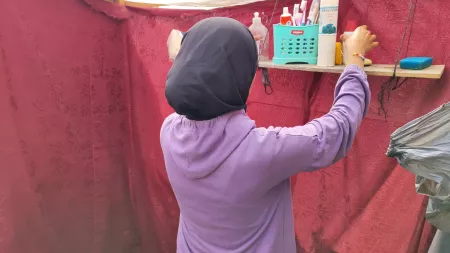Life for women and girls in Gaza has become a daily ordeal. Their struggles go beyond the already devastating lack of food, displacement and bombing risks faced by all of the population. Lack of sanitary pads, privacy, functioning toilets, safe drinking water have massively increased health risks and affected the mental health of over 1 million women and girls in the strip.
Pregnant and breastfeeding mothers are especially at risk from contaminated water. Over 540,000 women of reproductive age struggle with menstrual hygiene management, needing millions of sanitary pads monthly but having limited access. This forces many to use unsafe alternatives, increasing infection risks and limiting daily activities.
CARE has spoken to three women in Gaza who have told us about their daily ordeal.
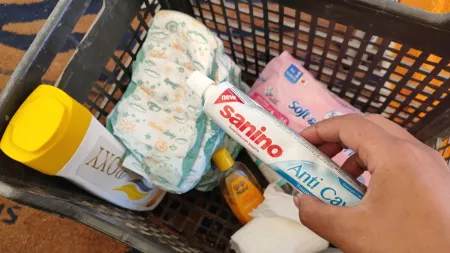
Sara, 18: “The worst time is when I have my period.”
“Sometimes it feels like our entire day evolves around finding food and water, using the toilet and washing ourselves. Since the war escalated, we were displaced multiple times - from Gaza City to Rafah to Khan Younis. We live in a tent in the desert, enduring temperatures above 40 degrees; It is unbearable. I have been sick for months - sick from poor quality food and drinking; sick from all the dust in the air.
Personal hygiene is a huge challenge for us. Essential items like toothbrushes, toothpaste, sanitary napkins, and shampoo - everything that used to be available is now impossible to get. How can we afford to buy toothpaste when we're struggling to buy food?
I have heard some are resorting to using old clothes and towels instead of sanitary napkins.Sara*, 18-year-old woman displaced by the war in Gaza
It is especially hard for me when I have my period. We share a bathroom with three families. I only have a few minutes to use the toilet as there is always a long queue outside. I have to be quick; I cannot take the time I need. I always carry my personal items and my own bin bag otherwise, I feel embarrassed. We also hardly get any toilet paper, as it is expensive and often unavailable.
When I have my period, I wish I could properly clean myself. I have heard some are resorting to using old clothes and towels instead of sanitary napkins. I am fortunate my parents go to great lengths to find napkins for me, making life slightly more bearable. Once, we received hygiene supplies including sanitary napkins as humanitarian aid, which was incredibly helpful. However, no aid has reached us in weeks.
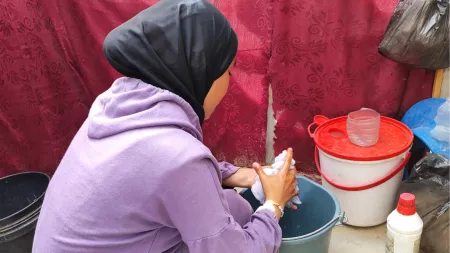
We do not have enough water to wash ourselves properly. Especially now, with the heat and the dust, I wish we could wash ourselves every day. We bathe ourselves once a week, sometimes only once a month. It takes more than an hour to fetch water - 20 minutes to reach the nearest well, and then about an hour to fill the buckets and another half an hour to return. I am afraid to get water. It's always crowded and there's always bombardments going on - large gatherings are often their target. I try to fill the buckets as quickly as possible and return to my tent straight.
Sawsan, 30: “My baby has a skin rash because we cannot afford to change her diapers as often as we should.”
“These past months have been an absolute nightmare. We had to leave our home in northern Gaza just a few days after the war started. We have been living in very bad conditions - it has drastically affected our physical health, mental health, and financial situation. My husband lost his parents and all his siblings after their house was bombed. No one survived. Our three children and I are the only family he now has left.
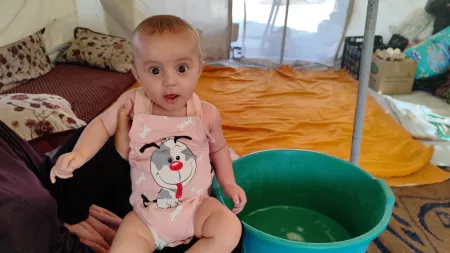
We struggle to feed our children and lack sufficient water. As a woman and mother, I constantly face the challenge of having no privacy. Living in a tent means everyone can see and hear everything. We share a bathroom with many others, with no hygiene or clean space. Whenever I need to use the bathroom, I must bring my little personal bag. These past months, I haven't had proper sanitary napkins, and we don’t have enough clothes or water to wash ourselves or our underwear. These basic hygiene needs are essential, yet maintaining them has been impossible.
After I bathe my children, I reuse the same water to wash our clothes. When I have my period, I use the same hygiene pad for the entire day.Sawsan*, 30-year-old mother of three displaced by the war in Gaza
I used to bathe my children almost every day and now I wash them once a week. This is hard, because we live in the middle of the desert, and everything is coated with dust in the tent. After I bathe my children, I reuse the same water to wash our clothes. When I have my period, I use the same hygiene pad for the entire day. Every woman will understand what this means and how uncomfortable it is. When I need to use the bathroom, I frequently have to wait a long time. Usually, my husband fetches water for all of us, often waiting for hours. When he's not around or is out searching for food, I take the children and go instead.
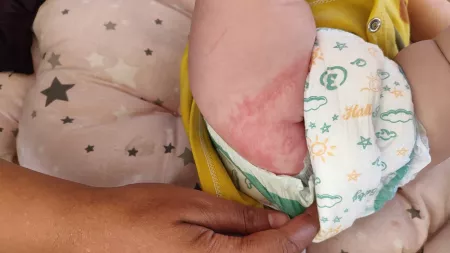
I gave birth to my youngest child in January 2024, between all the chaos and constant bombardment. I still remember the smell of phosphor and the sound of the airstrikes. I had a C-section, and it took me weeks to recover. The lack of vitamins and proteins, water, and food - these are detrimental to the health of pregnant women and young mothers. The situation for babies is equally dire. With no formula available, I have to use any other milk I can find. It is hard to find diapers. My baby developed a rash because we often have to leave the diapers on longer than recommended. As a mother, every moment of this war is filled with fear. I constantly worry about my children’s safety, fearing that they might be harmed or killed."
Eman, 35: “I cut up diapers because I had no sanitary napkins”
"I am divorced and solely responsible for my two children. As the head of the household, I have no support. I cherished the life we had before the war, constantly recalling the memories and the life we built together. Now, everything we worked for is gone. We live in a place with no privacy, insufficient food and water, and poor sanitation. Everyone around us is frequently ill. Although I manage to earn some money working as a drama teacher for children, it’s not enough to sustain myself and my children.
I cherished the life we had before the war, constantly recalling the memories and the life we built together. Now, everything we worked for is gone.*Eman*, 35-year-old teacher and mother of two displaced by the war in Gaza
We have no proper bathroom. With the help of two other families, we dug a hole into the ground and use a bucket. We have set up some tarpaulins around it to at least create some privacy. We used to clean our bathroom with detergent and water, however, our makeshift bathroom is difficult to clean properly due to the way it's constructed.
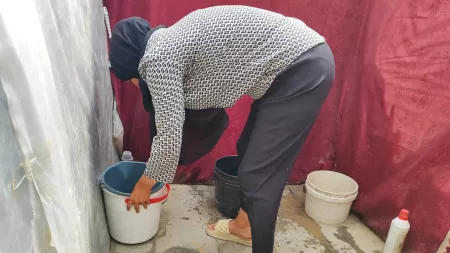
We can only wash ourselves once a week because there is simply no water available. I reuse the water for all three of us. Changing the sanitary napkins is also a hassle. It is hard to change them in the cramped space we have, and people often just barge into our bathroom without knocking.
During period cramps, I used to sit on the toilet for long but now there is no toilet to sit on. It is very uncomfortable. When I ran out of sanitary napkins, I ended up cutting up a children’s diaper to use as a substitute.
I also miss a proper toothpaste. As my teeth are very sensitive, I used to brush them with a soft toothbrush and a special toothpaste. Before the war, I used special shampoo as my skin gets irritated easily. Now we are using soap bars for everything. It is difficult to wash our hair as we do not have enough water to properly get the residue out.
It breaks my heart that I cannot keep my children safe and healthy. I do what I can – but nothing around us is healthy, neither the food nor water.Eman*, 35-year-old teacher and mother of two displaced by the war in Gaza
My children are suffering from all the dust. When they play outside, I have to change their clothes when they come back as they struggle to breathe. We do not have enough water to wash the clothes, it's hard to get all the dirt and dust off them.
Both children have been sick for months. They suffer from stomach aches. I took them to different clinics and health centers whenever I could. It breaks my heart that I cannot keep my children safe and healthy. I do what I can – but nothing around us is healthy, neither the food nor water.
As a mother, I want nothing but to provide my children with a safe place to live, good food to eat, and clean water to drink. I want them to continue their education and live their dreams. It makes me sad to think that our lives have been reduced to this. I wonder whether this will ever change again. My wish is that the world can, even just for a few minutes, be with us, feel what we are feeling, suffer what we are suffering. Maybe then this war can finally stop."
*Name changed to protect the respective identity.
